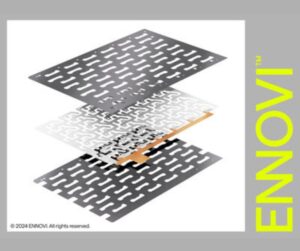ENNOVI, a leading mobility electrification solutions partner, has introduced a groundbreaking cell contacting system (CCS) lamination approach, setting a new standard for EV battery module assembly. The company has rigorously tested polyethylene terephthalate (PET) insulation foils and adhesives from multiple suppliers to ensure optimal bond strength, durability, and environmental impact. This research has resulted in a comprehensive database of material recommendations, streamlining the CCS design process and bypassing the trial-and-error approach prevalent in the industry.
Streamlined Assembly Process
Traditionally, assembling the CCS on battery cells has involved cumbersome methods such as molded plastic trays and foams for positioning. While effective, these methods add unnecessary weight and complexity, particularly as module sizes increase. Recognizing these limitations, ENNOVI has pioneered the use of both hot and cold lamination processes, eliminating the need for trays or foams. By recommending specific lamination material combinations, the company offers OEMs and Tier 1 suppliers a streamlined, adaptable solution that enhances precision without mechanical constraints.

“Our move towards lamination signifies a major leap in our ability to position collectors with precision, without the mechanical constraints imposed by conventional methods,” Till Wagner, Product Manager for Energy Systems at ENNOVI, explains. “By curating a database of pre-tested PET foils and adhesives, we not only accelerate CCS design but also simplify the assembly process, opening up new possibilities for material and energy savings.”
Far-Reaching Implications
ENNOVI’s lamination advancements have far-reaching implications for the EV industry. With the capability to offer both hot and cold lamination processes, the company provides enhanced flexibility and efficiency to global OEMs and Tier 1 suppliers. By optimizing PET foil and adhesive selection, ENNOVI improves structural integrity, extends lifespan, reduces manufacturing cycle times, and minimizes environmental footprint.
Pioneering Sustainable Practices
As the industry shifts towards sustainable manufacturing practices, ENNOVI’s innovations position it at the forefront of EV battery module design and assembly. By focusing on methods that reduce or eliminate the need for traditional adhesives, the company addresses concerns regarding longevity, environmental impact, and manufacturing efficiency. “Our goal is to move beyond traditional adhesives, leveraging cutting-edge techniques to achieve a stronger, more sustainable bond,” says Wagner.
Also read – Full Interview – Scott Caveza, Staff Research Engineer at Tenable
Join our WhatsApp News Channel for quick updates – FYI9 News WhatsApp Channel


